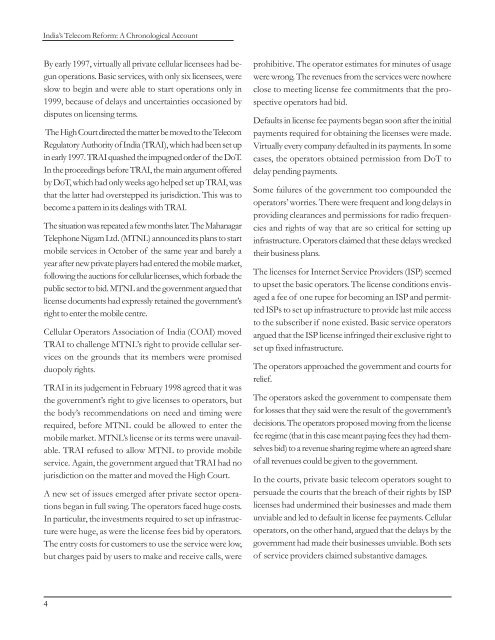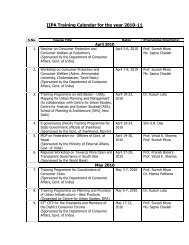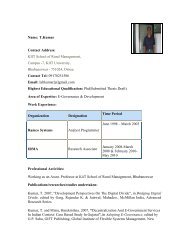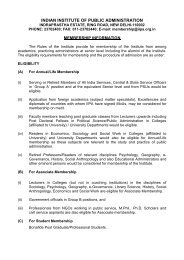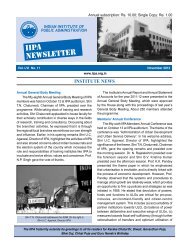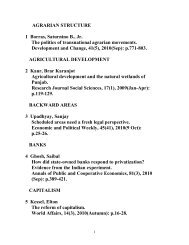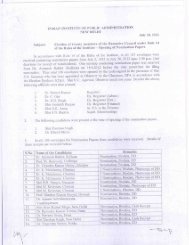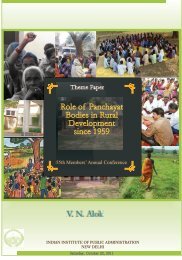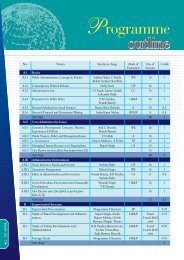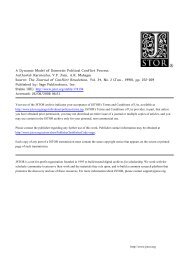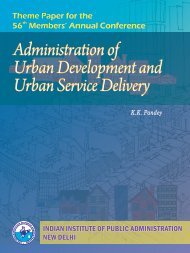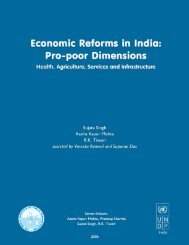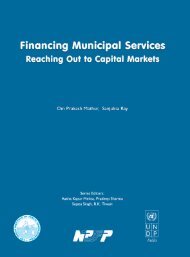India's Telecom Reform - Indian Institute of Public Administration
India's Telecom Reform - Indian Institute of Public Administration
India's Telecom Reform - Indian Institute of Public Administration
Create successful ePaper yourself
Turn your PDF publications into a flip-book with our unique Google optimized e-Paper software.
India’s <strong>Telecom</strong> <strong>Reform</strong>: A Chronological Account<br />
By early 1997, virtually all private cellular licensees had begun<br />
operations. Basic services, with only six licensees, were<br />
slow to begin and were able to start operations only in<br />
1999, because <strong>of</strong> delays and uncertainties occasioned by<br />
disputes on licensing terms.<br />
The High Court directed the matter be moved to the <strong>Telecom</strong><br />
Regulatory Authority <strong>of</strong> India (TRAI), which had been set up<br />
in early 1997. TRAI quashed the impugned order <strong>of</strong> the DoT.<br />
In the proceedings before TRAI, the main argument <strong>of</strong>fered<br />
by DoT, which had only weeks ago helped set up TRAI, was<br />
that the latter had overstepped its jurisdiction. This was to<br />
become a pattern in its dealings with TRAI.<br />
The situation was repeated a few months later. The Mahanagar<br />
Telephone Nigam Ltd. (MTNL) announced its plans to start<br />
mobile services in October <strong>of</strong> the same year and barely a<br />
year after new private players had entered the mobile market,<br />
following the auctions for cellular licenses, which forbade the<br />
public sector to bid. MTNL and the government argued that<br />
license documents had expressly retained the government’s<br />
right to enter the mobile centre.<br />
Cellular Operators Association <strong>of</strong> India (COAI) moved<br />
TRAI to challenge MTNL’s right to provide cellular services<br />
on the grounds that its members were promised<br />
duopoly rights.<br />
TRAI in its judgement in February 1998 agreed that it was<br />
the government’s right to give licenses to operators, but<br />
the body’s recommendations on need and timing were<br />
required, before MTNL could be allowed to enter the<br />
mobile market. MTNL’s license or its terms were unavailable.<br />
TRAI refused to allow MTNL to provide mobile<br />
service. Again, the government argued that TRAI had no<br />
jurisdiction on the matter and moved the High Court.<br />
A new set <strong>of</strong> issues emerged after private sector operations<br />
began in full swing. The operators faced huge costs.<br />
In particular, the investments required to set up infrastructure<br />
were huge, as were the license fees bid by operators.<br />
The entry costs for customers to use the service were low,<br />
but charges paid by users to make and receive calls, were<br />
prohibitive. The operator estimates for minutes <strong>of</strong> usage<br />
were wrong. The revenues from the services were nowhere<br />
close to meeting license fee commitments that the prospective<br />
operators had bid.<br />
Defaults in license fee payments began soon after the initial<br />
payments required for obtaining the licenses were made.<br />
Virtually every company defaulted in its payments. In some<br />
cases, the operators obtained permission from DoT to<br />
delay pending payments.<br />
Some failures <strong>of</strong> the government too compounded the<br />
operators’ worries. There were frequent and long delays in<br />
providing clearances and permissions for radio frequencies<br />
and rights <strong>of</strong> way that are so critical for setting up<br />
infrastructure. Operators claimed that these delays wrecked<br />
their business plans.<br />
The licenses for Internet Service Providers (ISP) seemed<br />
to upset the basic operators. The license conditions envisaged<br />
a fee <strong>of</strong> one rupee for becoming an ISP and permitted<br />
ISPs to set up infrastructure to provide last mile access<br />
to the subscriber if none existed. Basic service operators<br />
argued that the ISP license infringed their exclusive right to<br />
set up fixed infrastructure.<br />
The operators approached the government and courts for<br />
relief.<br />
The operators asked the government to compensate them<br />
for losses that they said were the result <strong>of</strong> the government’s<br />
decisions. The operators proposed moving from the license<br />
fee regime (that in this case meant paying fees they had themselves<br />
bid) to a revenue sharing regime where an agreed share<br />
<strong>of</strong> all revenues could be given to the government.<br />
In the courts, private basic telecom operators sought to<br />
persuade the courts that the breach <strong>of</strong> their rights by ISP<br />
licenses had undermined their businesses and made them<br />
unviable and led to default in license fee payments. Cellular<br />
operators, on the other hand, argued that the delays by the<br />
government had made their businesses unviable. Both sets<br />
<strong>of</strong> service providers claimed substantive damages.<br />
4


